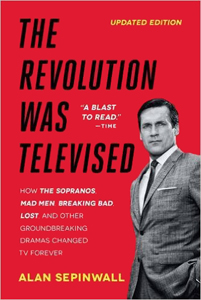
Here’s my conversation with Alan Sepinwall, TV critic for HitFix.com, about the updated version of his book, “The Revolution Was Televised: How The Sopranos, Mad Men, Breaking Bad, Lost, and Other Groundbreaking Dramas Changed TV Forever.” When he published the first edition in 2012, “Breaking Bad” and “Mad Men” hadn’t finished their runs, so he’s gone back and revised those chapters and added a few other observations in retrospect. Some of the topics we covered:
- Did the people running these shows have more freedom than most?
- Did those show runners have everything plotted out ahead of time, or did they improvise as they went along?
- What’s the impact of new distribution channels like Netflix, Amazon, Hulu, and Crackle?
- Shows like Netflix’s “Bloodline” and Amazon’s “The Man In The High Castle” go on for 10 episodes but drag in the middle – do they need to be that long?
- You and others have been writing show recaps and instant critiques – what do the show runners think of them?
- Towards the end of the run of “Mad Men,” you told Matthew Weiner that it had inspired many other shows of its type, but he didn’t agree? Why not?
- Why does the audience turned against the wives of anti-heroes (e.g. Carmela Soprano, Betty Draper, Skyler White)?
- Would FX’s “Fargo” be on your list of shows for the next book update?
Listen to our conversation here.
Previously on Harris Online…
